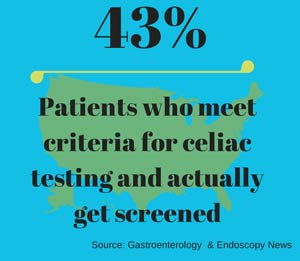 Celiac disease is incredibly underdiagnosed. According to the National Foundation for Celiac Awareness, the latest numbers show 83% of Americans with celiac disease are not diagnosed. Staggering.
Celiac disease is incredibly underdiagnosed. According to the National Foundation for Celiac Awareness, the latest numbers show 83% of Americans with celiac disease are not diagnosed. Staggering.
New data revealed this week suggests even the most likely doctors to test for celiac, may not be looking for it when they should. Gastroenterology and Endoscopy News reports fewer than half of people who should be screened for celiac disease are actually getting tested.
Celiac diagnosis guidelines require celiac screening for patients with chronic gastroenterology (GI) symptoms that point to malabsorption, like chronic diarrhea, the article explains. But after studying GI patients for three months at Washington University’s GI Center, Heba Iskandar, MD, leader of this study and assistant professor in the Division of Gastroenterology at Emory University School of Medicine, in Atlanta found some very interesting information.
According to the article, of 616 patients seen, “54% (336 patients) fulfilled indications for celiac disease screening using compatible criteria published by the AGA [American Gastroenterological Association] in 2006 and the ACG [American College of Gastroenterology] in 2013.” In other words, they fit the criteria for celiac testing.
From that number, researchers removed the few folks whose records indicated they were diagnosed with celiac at the hospital. Of the remaining patients, only 43% of them (145 patients) were screened for celiac. 4 of them had the serology for celiac and 2 were confirmed through biopsy. Researchers believe this means that because more than half weren’t screened, based on this information, that means several celiac cases could be missed every few months.
The article explains the rates at which the testing happened per clinic/department was interesting too:
- GI clinic tested 53% of its patients that had the criteria for celiac screening
- Inflammatory Bowel Disease (IBD) clinic tested 39.2%
- Hepatology (study of liver, gallbladder, pancreas, and their related disorders) clinic tested 27% of their patients that met the criteria
The article said Dr. Iskandar concluded the report saying “…these data suggest that a more rigorous strategy of identifying candidates is needed. Raising awareness is important, but other initiatives, such as programming EMR [Electronic Medical Record] systems to generate reminders, may result in testing of a greater number of candidates.”
In an article I published yesterday about IBD and gluten free diets, the researcher said once a doctor tests for celiac first, then a possible gluten-free diet treatment may be worth exploring. That certainly is not what appears to be happening, based on the numbers mentioned above.
I sure hope this article makes its way to doctors and it increases action on screening for celiac disease.
Tags: biopsy, blood, celiac, chronic, diarrhea, disease, gastroenterology, GI, panel, research, screening, symptoms, testing



Leave a Reply